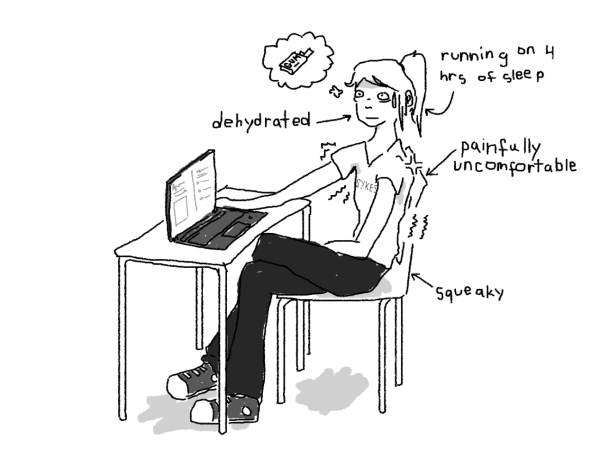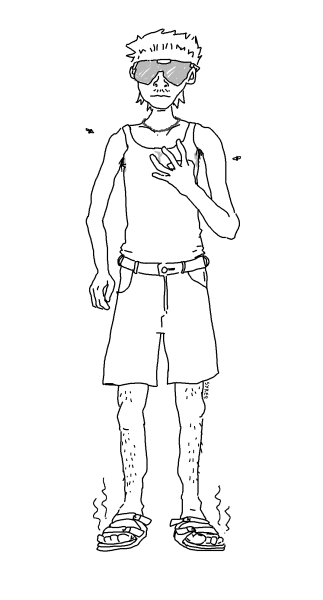Mental health days should be as normalized as sick days
You wake up to a swollen throat and a throbbing headache and instantly email your boss or teacher that you’re taking a sick day. On a different day, you wake up in a considerably bad mood. You’ve stayed awake all night for the past week taking many pages of textbook notes, writing essays, and doing endless amounts of math homework. You feel burned out, but you still get ready for school because it’s just “one of those days.”
When people get sick, they usually don’t hesitate to take a day off. However, when people feel overwhelmed, stressed, or mentally drained, many tend to neglect their feelings. Instead of ignoring mental health, students should heed to it by taking mental health days. The concept of taking mental health days should be as normal as taking a sick day from school.
A day off from school or work may be just as beneficial to students’ mental health as to their physical health. However, a stigma surrounding mental health still exists. People are often told “try not to worry so much” when they struggle with anxiety or other mental health issues.
Mental health plays a major part in overall health. Some mental illnesses have been linked with higher susceptibility to cancer and heart disease, as well as living shorter lives. Mental health greatly affects physical health, so it is important to monitor and take care of it.
Mental health concerns are all around us. According to the National Alliance on Mental Illness (NAMI), one in five Americans have experienced some form of mental illness. Tending to them is a key step in destigmatizing the concept of taking mental health days.
However, mental illnesses often go unnoticed and uncared for by those who experience them. The Federal Department of Health and Human Services estimates that only 17 percent of the US population operates in an ideal state of mental health. In addition to this, a relatively low number of people receive treatment. According to the NAMI, only 41 percent of people with mental disorders got professional help in the past year.
Failing to receive proper treatment may be a result of a lack of transportation, fear that others will find out, or inadequate health insurance coverage. Nearly 48 percent of people cannot afford the cost of treatment, according to Psychology Today. Though incomparable to receiving proper treatment, taking more mental health days can temporarily relieve people of stress and help prevent burnout.
It is important to recognize the signs that may signify that you need to take a mental health day. These include struggling to handle stress, controlling thoughts or emotions, not sleeping enough, relying too much on caffeine, or experiencing difficulty focusing.
A mental health day is essentially a day dedicated to self care. Self care can look different for everyone. One can nap, bake, journal, meditate, paint, hike, or call a friend.
The occasional mental health day is especially vital for students who often feel overworked. Many high schoolers seem trapped in a cycle of wake up, go to school, attend extracurriculars, do homework, eat dinner, sleep, repeat. This seemingly endless cycle can be exhausting for students, whether they acknowledge it or not. According to the American Psychological Association, 45 percent of teens report being stressed by school pressures.
Combined with the school-related stress that students feel, teenage suicide rates continue to rise. According to the CDC, suicide was the second leading cause of death for people ages 10-24 in 2017.
Many mental health concerns are a result of school-induced stress: schools must become aware of students’ mental health and allow them to take time off if needed. In 2009, Minnesota became the first state to pass a bill declaring that students may be excused from school not just for a sickness, but for mental health reasons. California should follow these exemplary states and honor students’ mental health. Proper mental health is just as important as proper physical health.
Your donation will support the student journalists of Archie Williams High School. Your contribution will allow us to purchase equipment and cover our annual website hosting costs. Each donation will receive a magazine subscription for a year (6 copies a year), and become a part of the important work our publication is doing.
$35 -- Subscription to the magazine
$50 -- Silver Sponsorship
$75 -- Gold Sponsorship
$100 -- Platinum Sponsorship

Samantha is a senior in her third year in journalism. She loves little old bookstores, the smell of almond extract, and rewatching Stranger Things. When...












